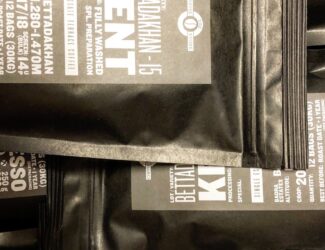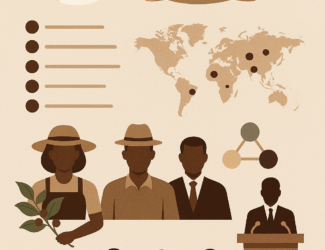
Cup of Excellence: The World’s Most Prestigious Coffee Award Explained
Have you ever sipped a coffee so distinct, so remarkable, that it stood apart from anything you’ve tasted before? It may have been a Cup of Excellence winner — the highest accolade a coffee can receive on the global stage.
Despite being a cornerstone of the specialty coffee world for over two decades, many consumers are still unfamiliar with the Cup of Excellence (CoE). Yet this competition has reshaped how coffee is evaluated, sourced, and celebrated worldwide.
A Global Movement Rooted in Quality and Fairness
The Cup of Excellence began in 1999 as a bold initiative by the International Coffee Organization (ICO), originally as part of the Gourmet Coffee Project in Brazil. Its goal was simple but revolutionary: recognize and reward the best coffees from each origin through a rigorous competition and a global auction platform.
Coffee farmers at the time were producing exceptional beans but receiving low prices, especially in the wake of collapsing commodity markets. The Cup of Excellence sought to change that by shining a spotlight on producers and connecting them directly with international buyers willing to pay top dollar for quality.
Key figures like Marcelo Vieira, Susan Spindler, Hidetaka Hayashi, Silvio Leite, Don Holly, and George Howell played foundational roles in launching the first competition. Since then, the initiative has grown significantly, expanding beyond Latin America to include origins in Africa and Asia. Today, the competition is organized by the non-profit Alliance for Coffee Excellence (ACE), which operates out of Houston, Texas.
How the Cup of Excellence Works
The CoE is more than just a tasting competition — it’s a rigorous, multi-stage process that assesses coffee quality with scientific precision.
-
Entry Submission
Farmers submit their best lots — often small microlots — for evaluation. Samples are carefully prepared to standardized specifications for consistent assessment. -
Preselection Round
National juries cup and score all entries using the CoE Cupping Form. Only coffees scoring 86 points or higher move on. -
National Jury Evaluation
A second round of cupping by national experts narrows down the field to the top 40 coffees. -
International Jury Evaluation
An elite panel of international Q Graders, roasters, and green coffee buyers conduct blind tastings over several days. Only coffees scoring above 87 qualify as Cup of Excellence winners. Coffees that score 90 or above receive the Presidential Award. -
Auction and Awards
Winning coffees are sold via a global online auction. Crucially, 100% of the proceeds go to the producers, offering them not just income but visibility and long-term market opportunities.
What Judges Look For
The competition uses a standardized Cupping Form tailored for CoE. It evaluates:
-
Flavor and aftertaste
-
Body and acidity
-
Sweetness, balance, and cleanliness
-
Overall uniformity and aroma
Each coffee is blind-tasted and scored out of 100. Coffees that don’t meet the minimum 86-point standard are eliminated early — making this one of the most selective competitions in the industry.
Why the Cup of Excellence Matters
The CoE is one of the few coffee awards that significantly impacts producers’ livelihoods. Winners often gain access to direct-trade deals, secure premium prices, and receive global recognition.
For buyers, CoE streamlines the search for exceptional coffee. It identifies unique lots with transparency, traceability, and verified quality. For consumers, it opens the door to experiencing truly extraordinary coffees — many of which were previously undiscovered.
Most importantly, the CoE helps elevate the standards of the entire coffee supply chain by emphasizing clarity in flavor, traceable sourcing, and excellence in post-harvest practices.
Notable Winners
2024 Highlights:
-
Brazil – Sítio Santa Luzia, Minas Gerais
Score: 92.32 | Variety: Yellow Catucaí | Process: Natural -
El Salvador – La Bendición, Alotepeque-Metapan
Score: 92.00 | Variety: Pacamara | Process: Honey -
El Salvador – Los Morales
Score: 91.8 | Variety: Gesha | Process: Natural
2023 Highlights:
-
El Salvador – Finca Mileydi
Score: 91.82 | Variety: Pacamara | Process: Semi-washed -
Honduras – Finca Pino de Oro
Score: 91.78 | Variety: Pacamara | Process: Natural -
Nicaragua – Finca Los Alpes
Score: 91.6 | Variety: Gesha | Process: Natural
Coffee of Excellence FAQs
What Is Cup of Excellence Rating?
Cup of Excellence rating is a scoring system that evaluates eight core coffee attributes — including roast color, sweetness, cleanliness, aroma, acidity, balance, defects, and overall appearance — on an 8-point scale. The judges add 36 to the accumulated score, resulting in a total out of 100. To qualify as a Cup of Excellence coffee, a sample must score at least 86 points.
How To Become a Cup of Excellence Judge?
Becoming a CoE judge requires deep expertise in coffee — including cupping, roasting, importing, and quality control. Ideal candidates often have certifications from institutions such as the SCA or CQI and a track record in assessing coffee quality. Judges are selected by invitation from the Cup of Excellence organizers.
Where Is the Cup of Excellence Held?
The Cup of Excellence began in Brazil, where Central and South American countries initially dominated. Since 2020, the competition has expanded globally, with events hosted in Rwanda, Ethiopia, Indonesia, Colombia, Peru, Mexico, and more. Each year, competitions rotate among top coffee-producing nations.



